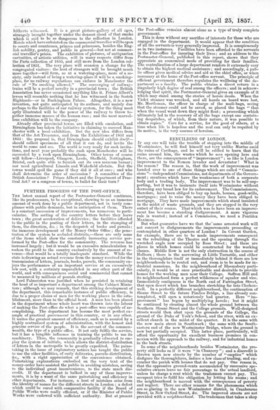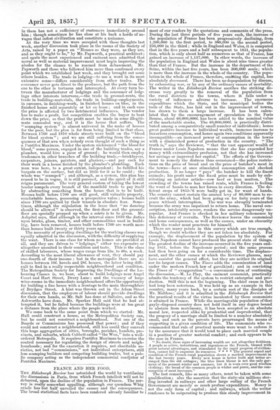REBUILDING OF LONDON.
IF any one will take the trouble of stepping into the middle of Westminster, he will find himself not very unlike Marius amid. the ruins of Carthage, and he will be edified to learn that the ruins around him, the wastes which he sees opening here and there, are the consequences of " improvement " ; se like is London improvement to the Roman invader and devastator What is the reason ? The reason is, that the work of improvement was handed over to one of those things which are called "Commissions "—independent Commissions, not departments of the Government; creations which have the weaknesses of both a corporate body and a trading body. The improvement was to be self-supporting, but it was to insinuate itself into Westminster without decreeing any broad law for its enforcement. The Commissioners, therefore, have been obliged to buy up lands, houses, good-wills, mortgages ; and to raise the money they have been obliged to mortgage. They have made improvements which stand insulated in the midst of waste grounds, and they are stopped in the very outset of their course. That which was to have been an improvement has become a standing disfigurement. A more vigorous rule is wanted ; instead of a Commission, we need a Pontifex Maximus.
But what guarantee have we that the-same arrested work will not convert to disfigurements the improvements proceeding or contemplated in other quarters of London ? In Covent Garden, for example, there are to be made improvements consequent on the rebuilding of the Theatre and the opening through the wretched angle now occupied by Rose Street ; and these are places in which homes could be constructed for the working classes. Middle Row is not the only obstruction in the course of Holborn ; there is the narrowing at Little Turnstile, and either in the thoroughfare itself or immediately behind it there are low neighbourhoods to be routed out, and room is to be made for industrial mansions. In the neighbourhood of Bloomsbury particularly, it would be at once practicable and desirable to provide homes for the working men near their College. Saffron Hill and its neighbourhood form a perfect wilderness of squalor and vice. Immediately contiguous is the North end of Farringdon Street, that open desert which has branches stretching far into Clerkenwell. In a perfectly different neighbourhood, the continuation of Sloane Street to the future Pimlico Bridge, a line already contemplated, will open a notoriously bad quarter. Here " improvement " has begun by multiplying hovels ; but it might be continued by clearing almost the whole ground between the Southern Sloane Street and the College grounds. Well-designed. streets would then abut upon the grounds of the College, the ground of the Duke of York's School, and the river, with an excellent church in the midst of the quarter. It is the same with the new main stteet in Southwark ; the same with the Southeastern end of the new Westminster Bridge, where the ground is now but partially occupied. This latter place, particularly, will afford the opportunity for excellent business premises in connexion with the approach to the railway, and for industrial homes in the back streets.
In some of the neighbourhoods besides Westminster, the property still looks as if it were "in Chancery " ; and a cliscredit is thrown upon new streets by the number of "empties" which disfigure the thoroughfares, induce a low class of trading, and encumber the parish with houses that do not pay. One reason is, that the oppressive ground-rents accumulated by successive speculative owners leave no fair percentage to the actual landlord, unless he charge a rent which the tradesman cannot pay. The occupant tries to fulfil his obligation by letting his rooms; and the neighbourhood is marred with the consequences of poverty and neglect. There are other reasons for the phenomena which are so glaring in the new Westminster district, in Cranbourne Street, in New Oxford Street, &c. The improved streets are not provided with a neighbourhood. The tradesman that takes a shop
in them has not a sufficiency of customers immediately around him ; though sometimes he has close at his back a horde of savages that infest civilization and constitute a nuisance.
At the very time we were occupied with these thoughts last week, another discussion took place in the rooms of the Society of Arts, raised by a paper on "Houses as they were, as they are, and as they ought to be," by Mr. Papworth, a practical architect; and again the most experienced and eminent men admitted that moral as well as material improvement must begin improving the abodes for the classes to be rescued from debasement. Mr. Papworth and those who followed him more than confirmed every point which we established last week, and they brought out some others besides. The trade in lodging—to use a word in its most extensive sense—differs considerably from other trades. The consumer never gets direct to the producer, but the path from the one to the other is tortuous and intercepted. At every turn between the manufacturer of lodgings and the consumer of lodgings other interests intervene,—the trade in ground-rents, the trade in building-materials, the trade in building-employments, in carcases, in finishing-work, in finished houses en bloc, in the finished house sold separatelyor let on lease ; and in each ease the price is affected by two detrimental influences. The vendor has to make a profit, but competition enables the buyer to beat down the price, so that the profit must be made in some illegitimate concealed way, and it is the house that suffers. The " scamping system" is almost universal in the make of houses for the poor, but the plan is far from being limited to that class. Between 1760 and 1810 whole streets were built on the "blood for blood system" ; and we are still suffering from the consequences of that iera when nobody even thought of such a thing as Pontifex Maximus. tinder the system nicknamed "the blood for blood," some person, engaged in one of the building trades, say a plumber, would hire a piece of ground ; he would then employ tradesmen in other branches of the building trade,—bricklayers, carpenters, joiners, painters, and glaziers,—and pay each for their work in a house finished by the plumber's plumbing. Each man was here, to a great extent, independent; he fulfilled his bargain on the surface, but did as little for it as he could ; the whole was " scamped" ; and although, as a system, this plan has ceased to be in vogue, it is still pursued, and the spirit of it still reigns paramount. The very general custom of taking the lowest tender compels every branch of the manifold trade to pay itself by abstracting something from the house that is to be built. Houses built before 1700 are still good, still valuable property, comfortable homes, possessing a prospective value ; houses built since 1790 are quitted by their tenants in absolute fear. Sometimes, although the stipulation in the lease that "no dancing should be allowed" is observed, the first-floor and the groundfloor are specially propped up when a soirée is to be given. Mr. Ashpitel says, that although in the interval since 1810 the duties upon bricks, glass, timber, and other commodities used in building, have been removed, houses built before 1700 are worth more than houses built twenty, or thirty years ago. The necessity of providing dwellings for the working classes was equally admitted in the discussion, with the difficulty of supplying the want. There is one class for whom no homes are provided at all, and they are driven to "lodgings," either too expensive or altogether unsuited to their condition and taste. This is the class of skilled labourers, whose wages range from 25s. to 40s. a week. According to the most liberal allowance of rent, they should pay one-fourth of their income ; but in the metropolis there are no houses between 10/. hovels and 281. houses, the latter being difficult to find in a really respectable neighbourhood and condition. The Metropolitan Society for Improving the Dwellings of the Labouring Classes is, we hear, about to build lodgings near Angel Court and Hart Street; Drury Lane ; and the vacancy of large wine-rooms in the immediate neighbourhood offers the opportunity for building a fine house with a frontage to the main thoroughfare of Brydges Street. A hint was thrown out in the Adam Street discussion, that the employers of labour should provide dwellings for their own hands, as Mr. Salt has done at Saltaire, and as the Ashworths have done. Mr. Sparkes Hall said that he had attempted it, but he failed because the buildings were at too great a distance from the place where the people worked. We come back to the same point from which we started : Mr. Hall could construct a house, as the Metropolitan Society can, but he could not construct a neighbourhood. Not one of the Boards or Commissions has possessed that power ; and if they could not construct a neighbourhood, still less could they convert this huge aggregation of cities, boroughs, parishes, hamlets, precincts, and suburbs, which Cobbett called "the Wen," into a wellordered Metropolis. It requires Pontifex Maximus to exercise the control necessary for regalating,the design of streets and neighbourhoods ; and for the execution it requires, not charitable societies, not bad "commissions," not individual enterprisers, still less scamping builders and competing building trades, but a public company acting as the independent commercial coadjutor of Pontifex Maximus.

























 Previous page
Previous page